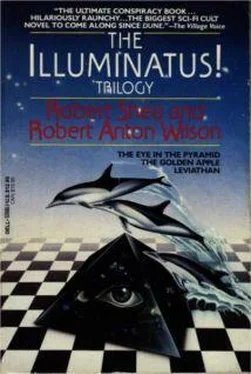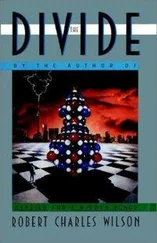Robert Wilson - The Illuminatus! Trilogy
Здесь есть возможность читать онлайн «Robert Wilson - The Illuminatus! Trilogy» весь текст электронной книги совершенно бесплатно (целиком полную версию без сокращений). В некоторых случаях можно слушать аудио, скачать через торрент в формате fb2 и присутствует краткое содержание. Жанр: Триллер, на английском языке. Описание произведения, (предисловие) а так же отзывы посетителей доступны на портале библиотеки ЛибКат.
- Название:The Illuminatus! Trilogy
- Автор:
- Жанр:
- Год:неизвестен
- ISBN:нет данных
- Рейтинг книги:5 / 5. Голосов: 1
-
Избранное:Добавить в избранное
- Отзывы:
-
Ваша оценка:
- 100
- 1
- 2
- 3
- 4
- 5
The Illuminatus! Trilogy: краткое содержание, описание и аннотация
Предлагаем к чтению аннотацию, описание, краткое содержание или предисловие (зависит от того, что написал сам автор книги «The Illuminatus! Trilogy»). Если вы не нашли необходимую информацию о книге — напишите в комментариях, мы постараемся отыскать её.
The Illuminatus! Trilogy — читать онлайн бесплатно полную книгу (весь текст) целиком
Ниже представлен текст книги, разбитый по страницам. Система сохранения места последней прочитанной страницы, позволяет с удобством читать онлайн бесплатно книгу «The Illuminatus! Trilogy», без необходимости каждый раз заново искать на чём Вы остановились. Поставьте закладку, и сможете в любой момент перейти на страницу, на которой закончили чтение.
Интервал:
Закладка:
"O my God, my God," Saul moaned, beginning to weep heavily again. " 'A rag, a bone, a hank of hair.' O my God. And you were with them!" he cried suddenly, raising his head. "You're a former Illuminatus- that's why you're so important to Hagbard's plan. And that's why you have that tattoo!"
"I was one of the Five who run the U.S.," Mavis nodded. "One of the Insiders, as Robert Welch calls them. I've been replaced now by Atlanta Hope, the leader of God's Lightning."
"I've got it, I've got it!" Saul said, laughing, "I looked every way but the right way before. He's inside the Pentagon. That's why they build it in that shape, so he couldn't escape. The Aztecs, the Nazis… and now us…"
"Yes," Mavis said grimly. "That's why thirty thousand Americans disappear every year, without trace, and their cases end up in the unsolved files. He has to be fed."
" 'A man, though naked, may be in rags." Saul quoted. "Ambrose Bierce knew about it."
"And Arthur Machen," Mavis added. "And Lovecraft. But they had to write in code. Even so, Lovecraft went too far, mentioning the Necronomicon by name. That's why he died so suddenly when he was only forty-seven. And his literary executor, August Derleth, was persuaded to insert a note in every edition of Lovecraft's works, claiming that the Necronomicon doesn't exist and was just part of Lovecraft's fantasy."
"And the Lloigor?" Saul asked. "And the dols?"
"Real," Mavis said. "All real. That's what causes bad acid trips and schizophrenia. Psychic contact with them when the ego wall breaks. That's where the Illuminati were sending you when we raided their fake Playboy Club and short-circuited the process."
"Du hexen Hase," Saul quoted. And he began to tremble.
UNHEIMLICH. Urvater whose art's uneven, horrid be thine aim. Harpoons in him, corpus whalem: take ye and hate.
Fernando Poo was given prominent attention in the world press only once before the notorious Fernando Poo Incident. It occurred in the early 1970s (while Captain Tequilla y Mota was first studying the art of the Coup d'Etat and laying his first plans,) and was occasioned by the outrageous claims of the anthropologist J. N. Marsh, of Miskatonic University, that artifacts he had found on Fernando Poo proved the existence of the lost continent of Atlantis. Although Professor Marsh had an impeccable reputation for scholarly caution and scientific rigor before this, his last published book, Atlantis and Its Gods, was greeted with mockery and derision by his professional colleagues, especially after his theories were picked up and sensationalized by the press. Many of the old man's friends, in fact, blame this campaign of ridicule for his disappearance a few months later, which they suspect was the suicide of a broken-hearted and sincere searcher after truth.
Not only were Marsh's theories now beyond all scientific credibility, but his methods- such as quoting Allegro's The Sacred Mushroom and the Cross or Graves' The White Goddess as if they were as reputable as Boas, Mead, or Frazer- seemed to indicate senility. This impression was increased by the eccentric dedication "To Ezra Pound, Jacques De Molay and Emperor Norton I." The real scientific scandal was not the theory of Atlantis (that was a bee that had haunted many a scholarly bonnet) but Marsh's claim that the gods of Atlantis actually existed; not as supernatural beings, of course, but as a superior class of life, now extinct, which had preexisted mankind and duped the earliest civilization into worshiping them as divine and offering terrible sacrifices at their altars. That there was absolutely no archaeological or paleontological evidence that such beings ever existed, was the mildest of the scholarly criticisms aimed at this hypothesis.
Professor Marsh's rapid decline, in the few months between the book's unanimous rejection by the learned world and his sudden disappearance, caused great pain to colleagues at Miskatonic. Many recognized that he had acquired some of his notions from Dr. Henry Armitage, generally regarded as having gone somewhat bananas after too many years devoted to puzzling out the obscene metaphysics of the Necronomicon. When the librarian Miss Horus mentioned at a faculty tea shortly after the disappearance that Marsh had spent much of the past month with that volume, one Catholic professor urged, only half-jokingly, that Miskatonic should rid itself of scandals once and for all by presenting "that damned book" (he emphasized the word very deliberately) to Harvard.
Missing Persons Department of the Arkham police assigned the Marsh case to a young detective who had previously distinguished himself by tracing several missing infants to one of the particularly vile Satanist cults that have festered in that town since the witch-hunting days of 1692. His first act was to examine the manuscript on which the old man had been working since the completion of "Atlantis and Its Gods." It seemed to be a shortish essay, intended for an anthropological magazine, and was quite conservative in tone and concept, as if the professor regretted the boldness of his previous speculations. Only one footnote, expressing guarded and qualified endorsement of Urqhuart's theory about Wales being settled by survivors from Mu, showed the bizarre preoccupations of the Atlantis book. However, the final sheet was not related to this article at all and seemed to be notes for a piece which the Professor evidently intended to submit, brazenly and in total contempt of academic opinion, to a pulp publication devoted to flying saucers and occultism. The detective puzzled over these notes for a long time:
The usual hoax: fiction presented as fact. This hoax described here opposite to this: fact presented as fiction.
Huysmans' La-Bas started it, turns the Satanist into hero.
Machen in Paris 1880s, met with Huysman's circle.
"Dols" and "Aklo letters" in Machen's subsequent "fiction."
Same years: Bierce and Chambers both mention Lake of Hali and Carcosa. Allegedly, coincidence.
Crowley recruiting his occult circle after 1900.
Bierce disappears in 1913.
Lovecraft introduces Halt, dols, Aklo, Cthulhu after 1923.
Lovecraft dies unexpectedly, 1937.
Seabrook discusses Crowley, Machen, etc. in his "Witchcraft," 1940.
Seabrook's "suicide," 1942.
Emphasize: Bierce describes Oedipus Complex in "Death of Halpin Frazer," BEFORE Freud, and relativity in "Inhabitant of Carcosa," BEFORE Einstein. Lovecraft's ambiguous descriptions of Azathoth as "blind idiot-god," "Demon-Sultan" and "nuclear chaos" circa 1930: fifteen years before Hiroshima.
Direct drug references in Chambers' "King in Yellow," Machen's 'White Powder," Lovecraffs "Beyond the Wall of Sleep" and "Mountains of Madness."
The appetites of the Lloigor or Old Ones in Bierce's "Damned Thing." Machen's "Black Stone," Love-craft (constantly.)
Atlantis known as Thule both in German and Panama Indian lore, and of course, "coincidence" again the accepted explanation. Opening sentence for article: "The more frequently one uses the word 'coincidence' to explain bizarre happenings, the more obvious it becomes that one is not seeking, but evading, the real explanation." Or, shorter: "The belief in coincidence is the prevalent superstition of the Age of Science."
The detective then spent an afternoon at Miskatonic library, browsing through the writings of Ambrose Bierce, J-K Huysmans, Arthur Machen, Robert W. Chambers, and H. P. Lovecraft. He found that all repeated certain key words; dealt with lost continents or lost cities; described superhuman beings trying to misuse or victimize mankind in some unspecified manner; suggested that there was a cult, or group of cults, among mankind who served these beings; and described certain books (usually not giving their titles: Lovecraft was an exception) that reveal the secrets of these beings. With a little further research, he found that the occult and Satanist circles in Paris in the 1880s had influenced the fiction of both Huysmans and Machen, as well as the career of the egregious Aleistair Crowley, and that Seabrook (who knew Crowley) hinted at more than he stated outright in his book on Witchcraft, published two years before his suicide. He then wrote a little table:
Читать дальшеИнтервал:
Закладка:
Похожие книги на «The Illuminatus! Trilogy»
Представляем Вашему вниманию похожие книги на «The Illuminatus! Trilogy» списком для выбора. Мы отобрали схожую по названию и смыслу литературу в надежде предоставить читателям больше вариантов отыскать новые, интересные, ещё непрочитанные произведения.
Обсуждение, отзывы о книге «The Illuminatus! Trilogy» и просто собственные мнения читателей. Оставьте ваши комментарии, напишите, что Вы думаете о произведении, его смысле или главных героях. Укажите что конкретно понравилось, а что нет, и почему Вы так считаете.











